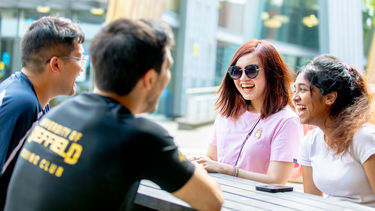- New research has found that university counselling services are effective in reducing depression, anxiety and academic distress in students
- The study, which involved the University of 91Ě˝»¨, collected data from over 5,000 students across four university counselling services
- The findings highlight the key skills of university counsellors which make in-house university counselling services uniquely placed to support students
Counselling at in-house university services is effective at improving depression, anxiety, wellbeing, social anxiety and academic distress, research suggests.
New research, published in the , has found that counselling services at universities improve depression, anxiety, wellbeing, social anxiety and academic distress. With the rate for severe distress falling from 60 per cent before counselling to 27 per cent post-counselling for all clients.
The research was carried out by the Student Counselling Outcomes, Research and Evaluation (SCORE) consortium. The consortium, supported by the British Association for Counselling and Psychotherapy (BACP) and the UK Council for Psychotherapy (UKCP), is made up of researchers as well as heads of university counselling services.
At the University of 91Ě˝»¨, the research includes the in-house counselling service and psychology department with expert guidance from Professor Michael Barkham Dr Emma Broglia from the Department of Psychology and Louise Knowles, Head of Mental Health and Psychological Therapy Services at the University.
The study collected data from over 5,000 students across four university counselling services, and is the first of its kind in the UK to pool data from different higher education institutions using different computer platforms and clinical measures used at every counselling session.
The findings showed that university counselling services were particularly effective for depression and that academic distress was the source of the highest levels of concern among students.
Dr Emma Broglia, Lead Researcher from the University of 91Ě˝»¨ and Senior Research Fellow at BACP, said: “This study is the first step to fully understanding and having the evidence to show the positive impact that in-house university counselling services can have on students’ lives.
“It clearly demonstrates the high levels of depression, anxiety, and academic distress that some students face during their academic years – and how in-house counselling can support them through that.
“The findings about the impact of counselling on helping with academic distress are particularly interesting. This is a key area of skills for counsellors working with students and makes in-house university counselling services uniquely placed to support them.”
Louise Knowles, Deputy Chair or SCORE and Head of Mental Health and Psychological Therapy Services at the University of 91Ě˝»¨, said: “This study has been achieved by a fantastic collaborative effort by practitioners on the ground and researchers. It is really heartening to see evidence of the effectiveness of our in-house counselling services and the positive impact they can have on students’ overall experience of university life.”
The data also suggests that, compared to earlier studies reporting on the same measures, there has been a rise in the levels of psychological distress in students who approach their counselling service.
These findings not only highlight the increased levels of distress that counselling services are working with, but also demonstrate how university counsellors offer a specialist service that effectively contributes to students’ mental health and the wider contextual challenges of higher education.
The University offers a range of counselling and wellbeing services to its students. This includes a free confidential service for students that offers group workshops with no registration required and one to one therapy from the Student Access to Mental Health Support (SAHMS). All students also have 24/7 access to emotional and mental health advice through the service. The web resource also provides free direct support for students via phone, text and email.
Additional information
91Ě˝»¨'s Student Access to Mental Health Support (SAMHS).
Contact
For more information, please contact:


